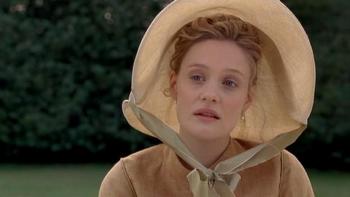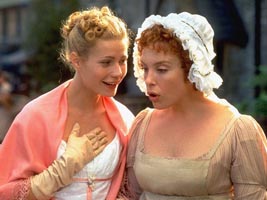 "People--their hopes, their dreams, their aspirations--there I am the expert."
"People--their hopes, their dreams, their aspirations--there I am the expert."~Emma Woodhouse, Emma (2009)
Emma is fascinating. As we all know, Jane Austen wrote of Emma, "I have created a heroine whom nobody but myself will much like." Far be it from me to dare to differ with Jane Austen, but... how could you help liking Emma?
The best word to describe Emma Woodhouse's personality would be vivacious. Emma is brimming with fun and lightheartedness,
bubbly mirth and optimism. She's sweet, entertaining, and delightfully, humorously meddlesome.
But Emma is not without her faults. In fact, Emma's entire story is about the development of her character. It's the only one of Jane Austen's novels to feature a character's name as its title--and that's not a mistake. Pride and Prejudice, Sense and Sensibility and Persuasion are all about those traits and how they're exemplified in the books' characters. Mansfield Park is about a specific place, a girl who grew up in that place and how it influenced her life. (Northanger Abbey is a little different. Maybe I'll write about Northanger Abbey in a later post. That is, if I can write a sensible post without gushing like a fan-girl over Henry Tilney.)

Romola Garai as Emma (2009)
Emma is, in short, about Emma. The book begins by telling us about Emma Woodhouse, who is handsome, clever and rich, and who has thus far gone through life with very little to distress or vex her. Jane Austen didn't waste any time in getting to the point about her heroine (unlike Leo Tolstoy, who allegedly didn't introduce the heroine into Anna Karenina until the thirtieth chapter). Emma is the focus of the story, and around Emma the first sentence revolves.
Back to what I was saying: Emma isn't perfect. From the very beginning, she shows herself to be thoughtless and even a little condescending in her treatment of her friends. She believes herself to know exactly what is best for everyone. In fact, she believes that she can find the perfect match for each one of her friends. I love the scene in the 2009 movie in which Emma's sister and Mr. Knightley's brother are getting married. (Emma, incidentally, predicted their marriage.) Mr. Knightley leans over the back of the pew and whispers to Emma, "Lucky guess." Emma raises an eyebrow and replies, "Nothing lucky about it. Just talent... and intuition."
Romola Garai as Emma (2009)

Louise Dylan and Romola Garai as Emma and Harriet Smith (2009)
"Well, look here. 'The wealth and pomp of kings.' Kings. What does that suggest?... Perhaps court. And 'the monarch of the seas.' Seas? Maybe a ship." (Emma, 2009)
Unfortunately, she carries all this a bit too far. "One day," Mr. Knightley reproves, "you will bitterly regret your meddling." But as yet, Emma doesn't regret her meddling. She greatly enjoys planning matches and getting involved in everything. I have to take a moment here to rave about Jane Austen's brilliance. Just listen to this passage from chapter nine. "She was sorry, but could not repent. On the contrary, her plans and proceedings were more and more justified, and endeared to her by the general appearances of the next few days." Does that not hit the nail of human nature on the head?
Emma's penchant for wit and humor endear her to many (including the reader) but, again, sometimes she carries it too far. At the Box Hill excursion, she thoughtlessly insults Miss Bates through trying to be funny. Cue the Mr. Knightley lecture. (Go, Mr. Knightley!) Emma doesn't stop to think about Miss Bates' feelings because Miss Bates doesn't fit into her little circle of friends. She isn't young or pretty or brilliant enough to meet with Emma's complete approval.
However, lest you think that I'm coming down too hard on Emma (I'm not, really I'm not! I'm just seeing a lot of myself in her), she is not unwilling to admit her faults once she finally realizes them. And it takes Mr. Knightley's rebuke to wake her up. "What have I done?" When she understands the full impact that her unkind words had on Miss Bates, she does everything she can to make amends.

The lovely Gwyneth Paltrow as Emma (1996)
Emma doesn't realize that she's in love with Mr. Knightley until she realizes how much she doesn't deserve his love--as one of my friends pointed out, it's actually a parallel of our relationship with Christ. Once she finally comes to grips with her feelings, the meddlesome part of her personality begins to fade away. Mr. Knightley, the true hero of the novel, is the one who brings about Emma's change. His proposal to Emma, beautifully acted in the 2009 miniseries, is followed by Emma's best line in the whole movie. "I find I... do not know what to think." For once the verbose, witty and always-correct Miss Woodhouse is completely at a loss for thoughts as well as words. 

The just-as-lovely Romola Garai as Emma (2009)
But they don't live happily ever after quite yet. There is still the question of what will become of Mr. Woodhouse. Cue my second favorite Emma line in the 2009 movie: "You know I love you, and I always will. But we can never marry. That's all." Here is Emma's selflessness finally brought to light. It was hidden a little too long, but now each one of us can see it and admire her for it. She's willing to give up happiness with Mr. Knightley for the sake of her father--to paraphrase Mr. Knightley: "Well done, Emma."
(See the clip below for Emma's Selfless Scene--don't you just love the little hand-holding thing at the end? Have I mentioned how much I love Mr. Knightley?)
And that's my analysis of Emma Woodhouse. She's vivacious, she's funny, she's hasty, she's conceited, she's sweet, she's meddlesome, she's repentant, she's loving, she's delightful.
She's Emma.





























